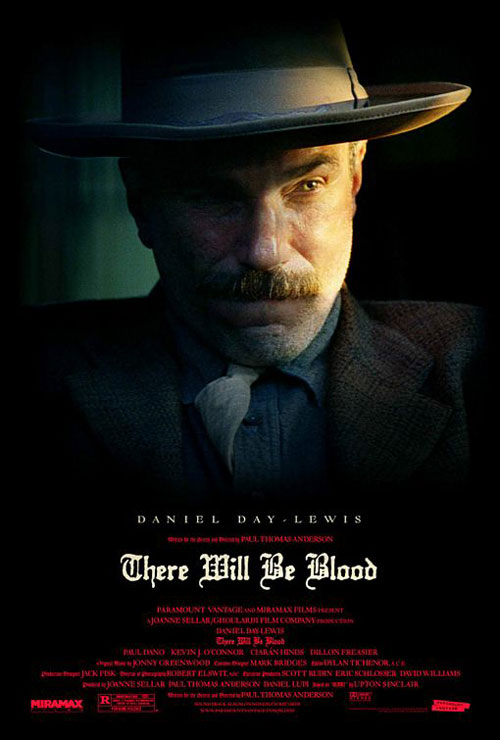Review: There Will Be Blood (2007)
 Note: This article was originally published in Technician on January 23, 2008.
Note: This article was originally published in Technician on January 23, 2008.
-----
Anderson strikes it rich
There Will Be Blood is the latest offering from director Paul Thomas Anderson, and marks his first film since Punch-Drunk Love in 2002. Nominated for eight Academy Awards, the film was just released widely this past weekend. The word-of-mouth on the film was that it was a masterpiece; one critic even referred to it alongside The Godfather and Citizen Kane as possibly the best of all time.
I don't know if I'd go that far, but one thing is for sure: There Will Be Blood is certainly filmmaking at its finest.
Anderson, who in films like Boogie Nights and Magnolia focused on an ensemble of characters and their relationships, this time turns his lens on a single oil prospector (Daniel Day-Lewis) in the early 1900s as he attempts to find the land with the most oil that he can buy for the cheapest price. Morality is not an issue, as he has no regard for any other human life except his own -- in his own words, "I see the worst in people." He will lie, cheat and even resort to murder, all in the name of profit.
In his quest for wealth, Plainview encounters a rival in the form of Eli Sunday (Paul Dano), a religious fanatic who opposes anything that might prevent people from coming to God -- specifically, through his church. And it is in this conflict that Anderson shows how he has matured as a filmmaker, for he focuses not only on character development but also on thematic development. Though in past films he frequently focused on the relationship between parents and children (and this is still present here), he broadens his view this time to also examine the American ideology that was born in the rush for oil in the early 1900s.
Plainview and Sunday provide the perfect metaphors for what happens when capitalism and religion are taken to the extreme and twisted for personal gain. In Anderson's portrait of the early 20th century, these two concepts are the dominant cultural forces in people's lives, and both share an affinity for blood, either that resulting from brutal competition or what Eli refers to as the "saving blood" of Christ. It's a bleak and desolate view of how certain American ideals began, but as Anderson himself has acknowledged, it's a view many people can relate to today.
Day-Lewis gives arguably the best performance of the decade, delivering his lines in a gruff growl that elicits chills -- whether he's talking about murder or milkshakes. And it's not just the voice, it's every little gesture and movement. In the very first scene, Day-Lewis and Anderson work so well together that they are able to firmly establish Plainview as a multi-dimensional character without a single word of dialogue. The rest of the actors are also top-notch, particularly Dano, who shows he's quite capable of handling himself alongside the older, more experienced Day-Lewis. If this is any indication, we can expect to see great things from him in the future.
The film is not without flaws, though there aren't many. A subplot involving a long-lost brother could have benefited from more development, and Plainview's characterization at times feels slightly out-of-place. But perhaps the latter is a strength rather than a weakness. Plainview is a moral enigma, alternating between savage cruelty and unexpected acts of kindness. Anderson has left his protagonist room to breathe and allows the audience to reach their own conclusions about his complicated psyche. Rather than telling viewers how to respond to Plainview, his direction is mature enough that images and silences are often more effective at gradually revealing his characters' motivations than dialogue.
There Will Be Blood is not a perfect film, and only time will tell if it goes down in history as a "classic." However, you'll be hard-pressed to find a better-crafted character study or a more thought-provoking exploration of American ideology.